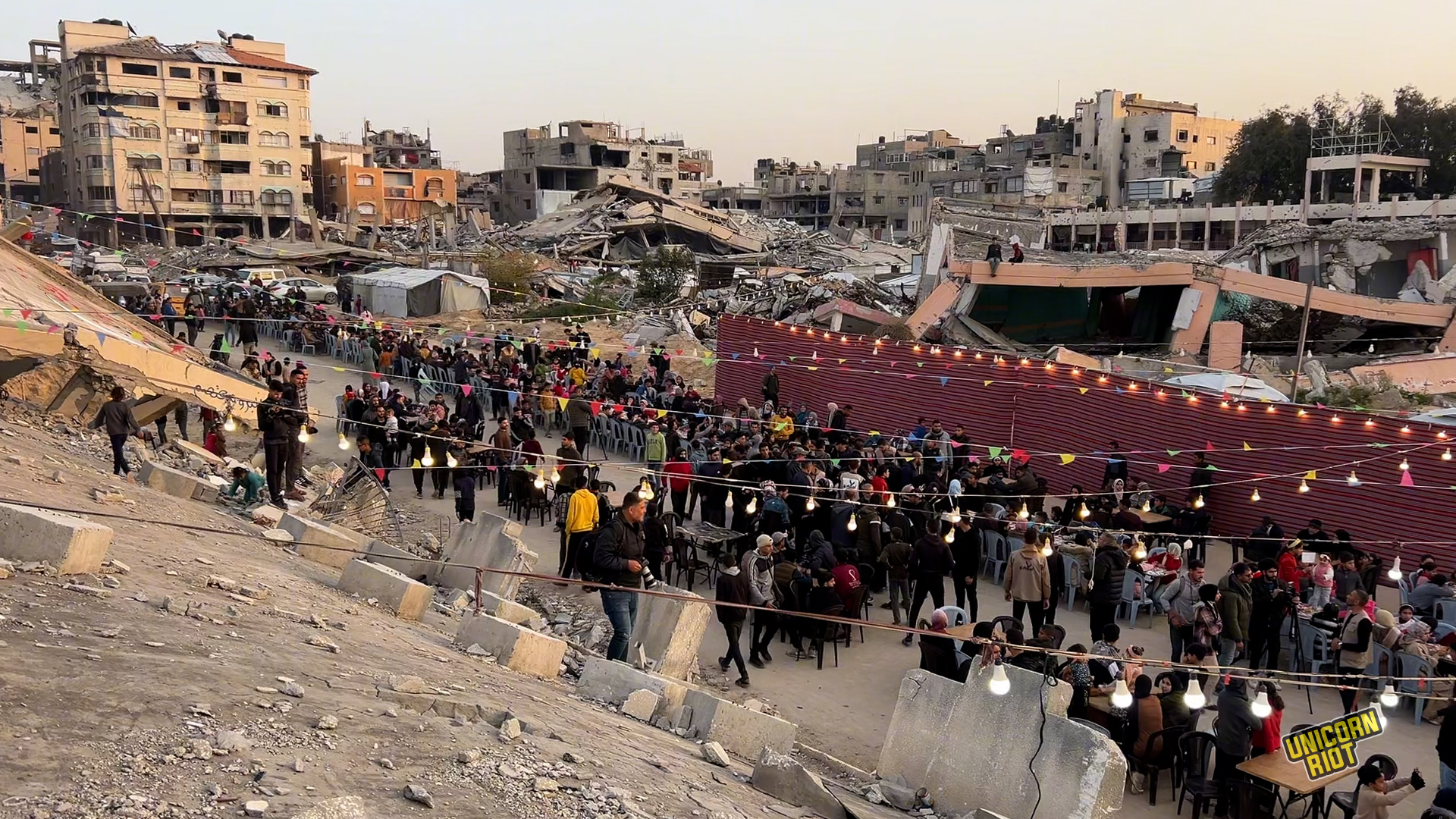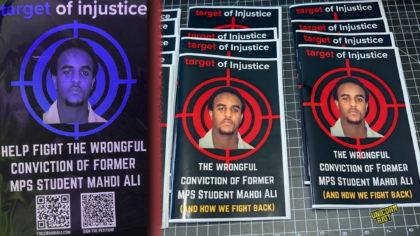Ramadan Among the Rubble in Gaza: A Collection of Stories
Gaza, Palestine — For Palestinians in the bombarded Gaza Strip, the holy month of Ramadan was stained by genocidal acts perpetrated by Israeli forces for the second year in a row. In attempts to understand those continuing to practice their faith whilst surviving horrors, Unicorn Riot heard from several people at several Ramadan events in Gaza, including Gaza City and Khan Younis.
More than two million Palestinians have been forcibly displaced at least once by Israeli forces since they started their war on Gaza. 19 months of Israeli attacks and besiegement have been in response to a Hamas-led attack on Israel in which 251 captives were brought back to Gaza to be held for exchange and around 1,139 were killed. Over 61,700 Palestinians have been killed in Gaza.
For more than 66 days now, Israel has been blockading any humanitarian aid, food, and medicines, sparking famine across the Strip. At least 57 people have starved to death.
Israel’s plan of ethnic cleansing and genocide on the Palestinians in Gaza is furthering its course as it has declared over 70% of the Strip a no-go zone.
Below is a transcript from interviews in each of the four settings.
Colorful Neighborhood in Khan Younis
“First of all, we say Happy Ramadan to everyone. Today is a beautiful day in Ramadan, organized by our people and community in Khan Younis in cooperation with Khan Younis municipality and with Today’s Family, to send a new and beautiful message: We celebrate this month despite the pain, despite what has befallen us, despite the deep wounds, despite the killing and genocide, and all the sufferings endured by the Palestinian people. I don’t believe any other people in the world has witnessed such a war of extermination, destruction and killing that has targeted everything beautiful in Gaza. But we would say that, by God’s willing, we will join hands and stand shoulder to shoulder to rebuild Gaza once again. Because our people, like all people of the world, yearn for life. Our people long to hold onto their land and holy sites, by God’s will until they achieve their legitimate rights guaranteed by international law and conventions.”
Alaa Al-Bata, Mayor of Khan Younis
“I came today to attend the Mawlid (Prophet’s birthday celebration) we organized in our neighborhood. Thank God we brought joy to ourselves with the Mawlid and decorated the neighborhood. Honestly, I feel happy and the community does too, because we never expected to return like this. Thank God, by God’s will, we decided this year to decorate the neighborhood, bring joy to ourselves and the children, thank God.”
Mays Shabir, Palestinian in Khan Younis, Gaza
“Thank God, last year we were at Al-Mawasi throughout Ramadan, our hearts broke being away from our neighborhood and area. But thank God this year God has blessed us with our return to our neighborhood and homes. Through the efforts of our young men and women, and everyone, we managed to restore our neighborhood. As you can see, it’s called the Colorful Neighborhood.”
Umm Hamdi Abu Al-Ata, Palestinian in Khan Younis, Gaza
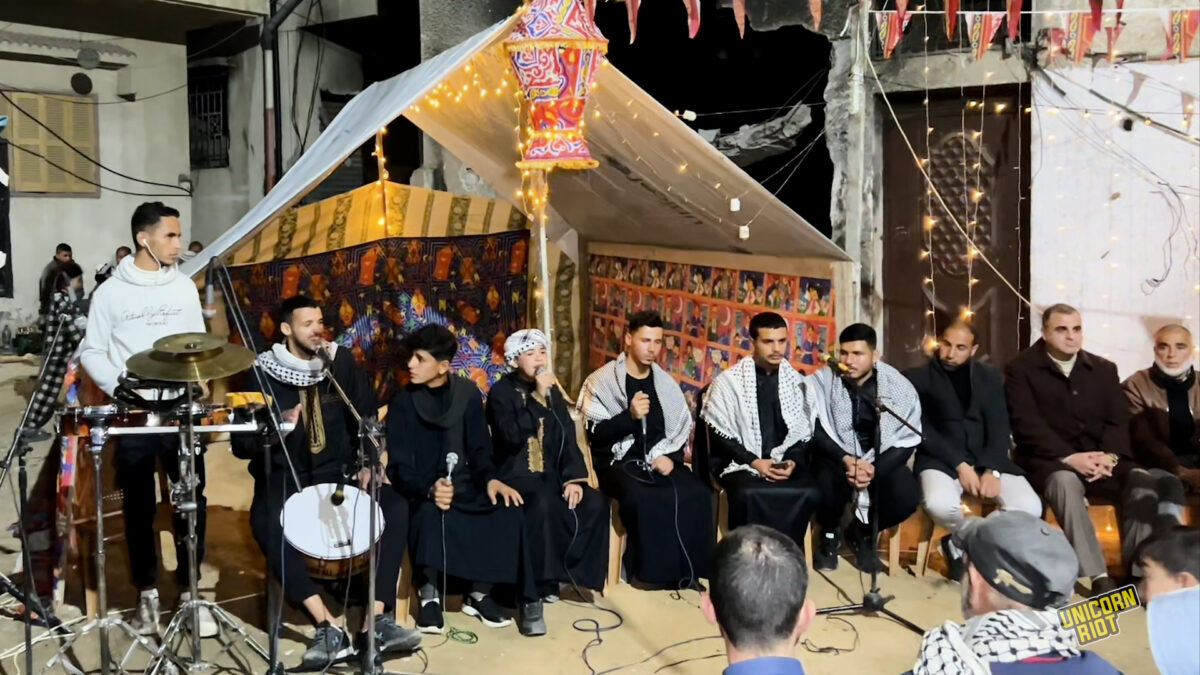
Community Iftar in Gaza City
“Today, we’ve come to this communal iftar to show the whole world that we are all here, united as one. All families, all clans and tribes. We are all here at one table, this communal iftar is ours, by God’s will. We are one family—there are no differences between us, no higher or lower. Here, we are one family.“
Abu Muhammad Salah, Displaced Palestinian in Gaza
“We’re having a communal iftar, and may God ease our worries. Enough with wars—we want to live the life God has created us for. To live in peace, security and peace of mind. In fact, we’re displaced—first and foremost, we’re displaced. Our homes are all destroyed. We’re displaced. But despite the wounds, despite the death, despite the pain, despite all the destruction—we just want to live. We want to live. And praise be to God in all circumstances. The reunion with my children, my beloved ones, my daughters, and my grandchildren equals the whole world. May God rebuild Gaza. May it be rebuilt by God’s will. May we return, by God’s will, and live in our homes again.”
Umm Ahmed Al-Mazini, Displaced Palestinian in Gaza
“What brought me here is that I’m also living in a tent in the Egyptian camp—thanks to “Egyptian Hands.” They provided us with a communal iftar, and we love it. We want an atmosphere of joy, a Ramadan spirit like this one, bringing us together with loved ones, neighbors, and family, filling our hearts with joy and healing our spirits. Of course, after what we’ve seen and endured in this war— last Ramadan, we didn’t feel Ramadan at all. We didn’t experience any Ramadan atmosphere whatsoever. It was a terrible Ramadan for us—nothing but death and destruction. But praise be to God, now, by God’s will, we’re rebuilding in Gaza. For a year and a half under siege and starvation. We’ve endured all kinds of sufferings—hunger on one side, killing and death on another, martyrs on another, and the destruction of homes we built with our life’s blood, all our life’s work—is gone with these homes, apart from the families that we lost too. Two-thirds of them are lost. But praise be to God, now we will stand on our feet once again and we’ll rebuild and bring back our victory, by God’s will.”
Umm Youssef Al-Shinawi, Displaced Palestinian in Gaza
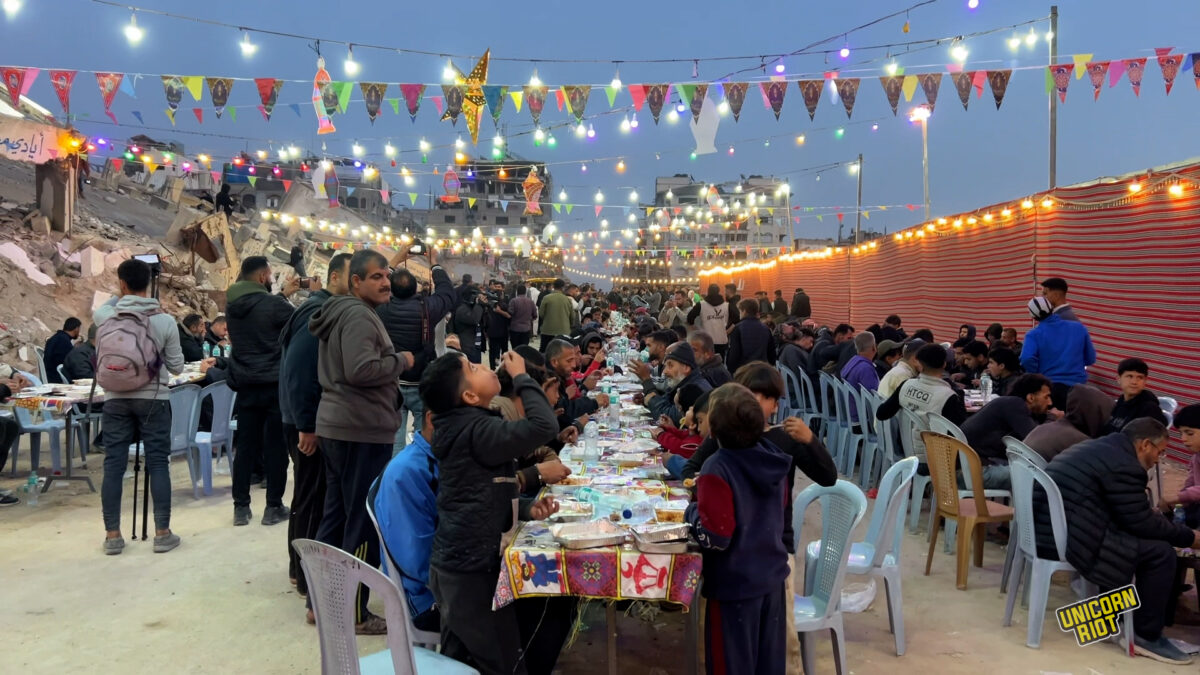
Eid al-Fitr Prayers at Great Omari Mosque
“Honestly, during this war period, this is our third successive Eid since the war began. From the beginning until now. Before the war, our Eid rituals and celebrations were complete Eid prayers, preparation, greetings, family visits — everyone would visit relatives, go house to house to greet and celebrate, bringing joy to one another. But now—people are stuck—travel crossings are closed. And the situation is extremely difficult — everything people are going through, living in fear and anxiety, under siege from all sides. People, especially the poor, can’t even afford clothes for their children. Honestly, here in Gaza, despite all the destruction, our historical sites still have a special place. Even amidst the bombardment and devastation, this mosque—the Great Omari Mosque—as God wills, people still come to pray, and that’s why this place seems to resemble those in Jerusalem. Of course, this has always been a dream for everyone living in Gaza—we wished to celebrate this Eid under better and improved conditions. But thank God despite all difficult circumstance the people of Gaza themselves still help each other. Despite the rigid practices the occupation uses, and all this destruction, the people of Gaza still exist. In the current moment, surveillance drones are in the sky. Despite all the usual brutal practices of the occupation against our people, we are still steadfast. People come and perform the Eid prayer. Eid prayer is like any day or Eid celebration.”
Zakaria Al-Dabba, Displaced Palestinian in Gaza
“We pray that next year this occupation and hardship will be lifted, and that people, God willing, return to their homes. May it be a good year for everyone. Truly, praise be to God. This Eid is one of patience and trust in God after all people have endured. We woke up this morning, thank God, we went to pray— but the planes were still overhead, and the bombing and destruction were still there. But we relied on God and our faith. Honestly, we’re living in tents, and the [Israeli] forces are targeting us 24 hours a day, but still, we have strength and determination, and we came to pray together Al-Eid’s prayer with the people, in the historic mosques destroyed by the occupation. This isn’t just stone—this is history, and they want to erase every trace of it. For me—my brother was martyred. And so was my cousin. Our homes were destroyed completely, even during the truce, the shelling continued. Praise be to God, many of our brothers’ children and relatives were martyred in this very area. And this, honestly—is the Eid of wounds, sorrow, pain, and tragedy. I wake up wanting to greet my mother—to find her crying. She lost her son, the one she relied on most—he helped her, moved her around—and now she says: “I have nothing left.” I just tell her—may God compensate you. What else can we do? Her martyred son left eight children, eight of them at home. All of them were dependent on him.”
Umm Hamdi Abu Al-Ata
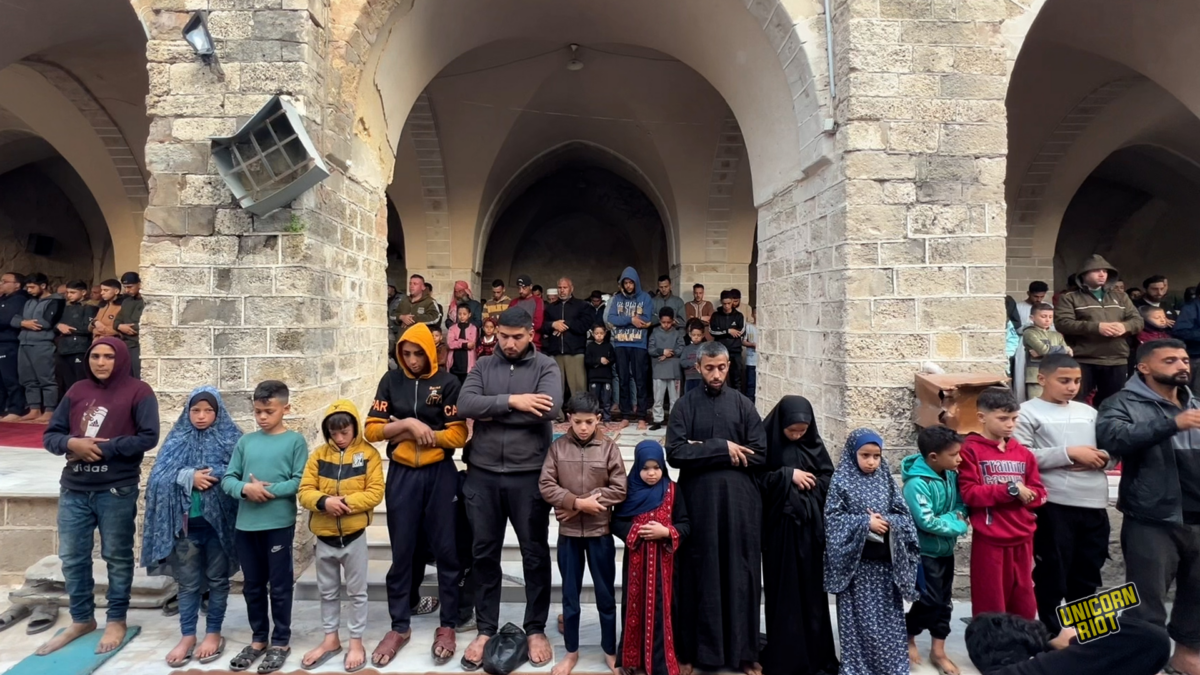
Gaza City Gravesite: Remembering Her Two Sons
“I lost Doctor Ramiz. The martyr—Hussein. His brother—his younger brother is 26. He never got to live his life joyfully. His daughter, Sundus is two years old. He just got married. May God never show you what we saw. Both of them, my sons, used to come see me every day in the morning. ‘Mom, what shall we do this Eid?’ They went, passed away. They went to the one who is better than me and you. They went to their Lord — He chose them. May God have revenge from those who killed them. Everyday they come over to me, day and night. Every hour I remember them—I open the living room door, they’re still not back from work. Why did I have to lose both of them? Praise be to God—I saw everything, I felt it in my heart before I saw it with my eyes. What can I say? My heart is broken. There is no power and no strength except through God, the Most High, the Great.”
Itiad Al-Sharif, Grieving over loss of two sons
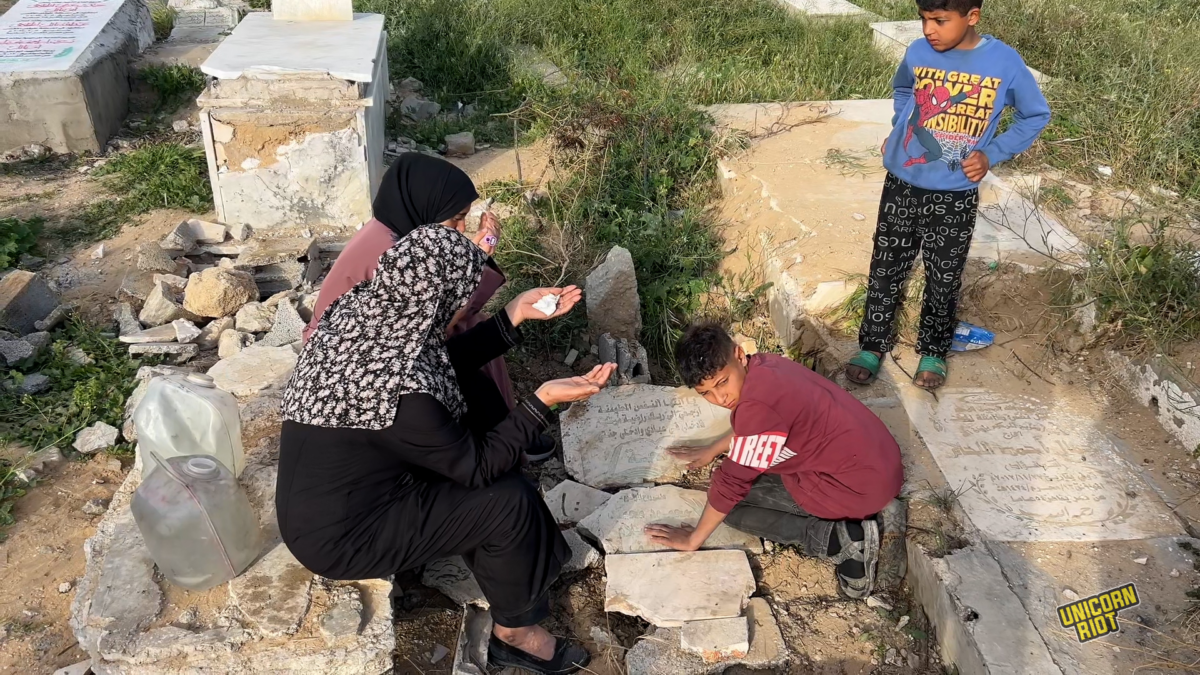
More media from Palestine in the image below.
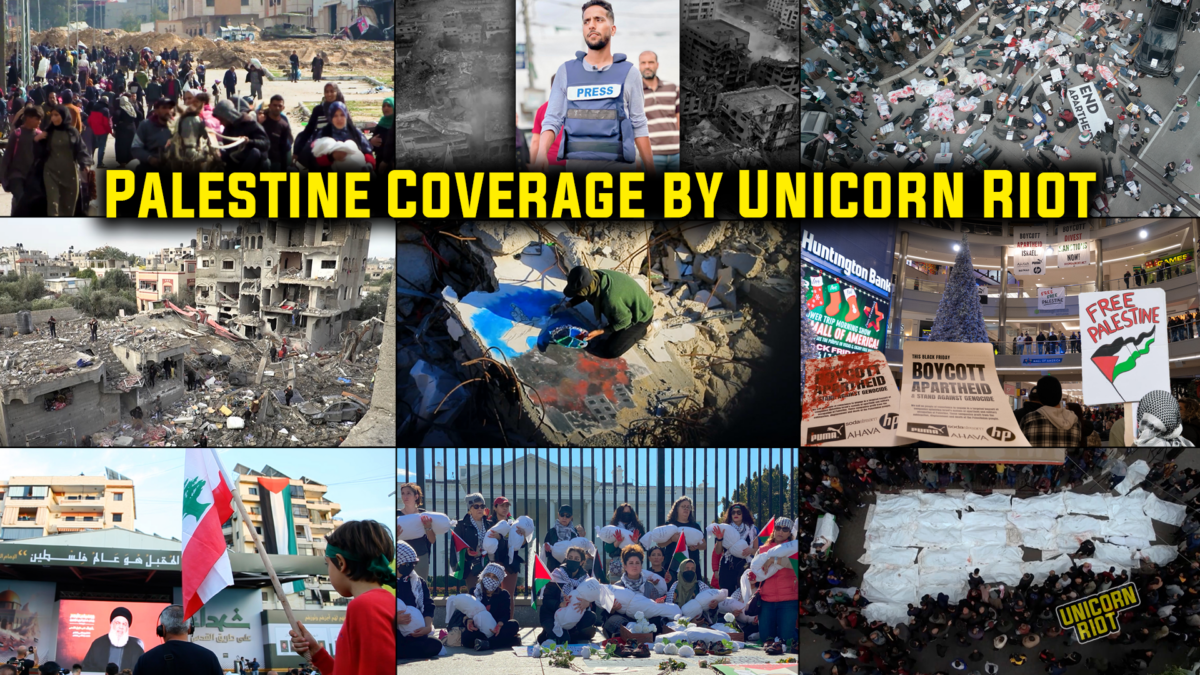
Follow us on X (aka Twitter), Facebook, YouTube, Vimeo, Instagram, Mastodon, Threads, BlueSky and Patreon.

